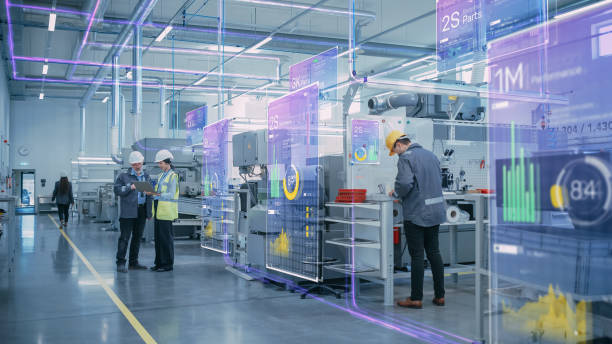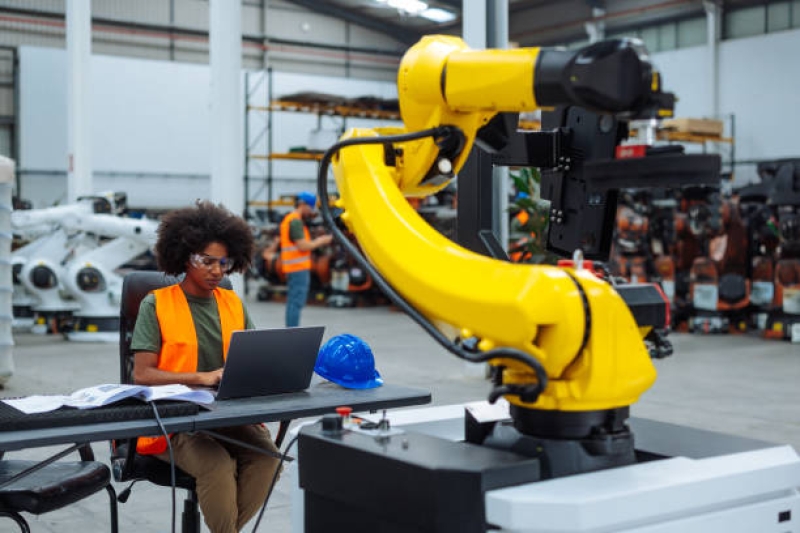In 2025, software will play a pivotal role in transforming the manufacturing sector, driving advancements in automation, connectivity, and efficiency. Here at Solweb we work with businesses right across the manufacturing sector including those in aviation, plastics, computers, marine and many others. We are looking forward to a busy year supporting our clients with developments in their respective businesses and helping them to increase profitablity.
In this blog we will take a look at several key areas that will contribute to the developments we expect to see in 2025.
1. Enhanced Automation and AI Integration
Manufacturers are increasingly adopting AI-driven solutions to automate complex tasks, improve decision-making and optimize production processes. Examples:
- Predictive Maintenance - AI-powered sensors predict equipment failures, allowing proactive maintenance, minimizing downtime, and reducing costs.
- Smart Warehousing - Robots and AI systems manage inventory, automate order picking and optimize storage space for efficient logistics.
- Quality Control - Computer vision identifies defects in production lines more accurately and faster than manual inspections.
This shift addresses workforce challenges and enhances productivity. Notably, 63% of manufacturers have implemented automation technologies, with an additional 30% planning to do so by 2025.

2. Evolution Towards Smart Factories
The concept of smart factories is becoming a reality, characterized by interconnected systems that enable real-time monitoring and autonomous decision-making. Technologies such as collaborative robots (cobots) and digital twins are being deployed to boost productivity and innovation. Other examples of the benefits of Smart Factories include improved quality, with advanced robotics and AI driven quality checks reducing the number of defective products. The ever important factor of cost efficiency is managed better with reduced waste, energy optimisation and maintenance savings due to the predictive maintenance reducing the number of machine failures and costly repairs. These examples ultimately create a faster time to market, as not only do concepts such as 3D printing and simulation tools accelerate development, but the improved efficient workflow ensures the seamless integration between design, production and supply chains, which in turn shortens lead times.

3. AI-Powered Predictive Maintenance
In the first of the examples listed above, we touched on Predictive Maintenance. This is a key area within the Manufacturing Industry that can have a big impact on the profitability of the business. AI is being leveraged for predictive maintenance, enabling manufacturers to anticipate equipment failures and schedule timely interventions. This approach minimizes downtime and extends machinery lifespan. Other benefits include:
Cost Savings
- Avoids expensive emergency repairs and reduces reliance on costly spare part inventories.
- Optimizes maintenance schedules, reducing unnecessary preventive maintenance and associated labor costs.
Enhanced Safety
- Identifies risks that could lead to accidents or unsafe conditions.
- Provides early warnings about potentially hazardous equipment malfunctions.
Scalability
- AI systems can adapt to monitor multiple assets across various locations, making them suitable for both small and large-scale operations.
- Provides a centralized platform for managing maintenance across the organization.

4. Integration of Large Language Models
The incorporation of large language models, such as GPT-4, into multi-agent manufacturing systems enhances adaptability and coordination. These models enable agents to communicate in natural language and interpret human instructions for decision-making, leading to more flexible manufacturing processes. LLM's can also be integrated into various applications. Examples include:
- Customer Support: Chatbots and virtual assistants.
- Content Creation: Generating blogs, reports, or summaries.
- Search and Retrieval: Enhancing search engines or creating question-answering systems.
- Education: Providing personalized learning experiences.
- Healthcare: Assisting in medical documentation or patient interaction.
- Software Development: Writing, debugging, or explaining code.

5. Emphasis on Cybersecurity and Data Protection
As manufacturing becomes increasingly digital, there is a heightened focus on overcoming interoperability challenges between new and legacy systems, prioritizing cybersecurity and ensuring data protection. Developing talent with a blend of technical knowledge, digital skills and soft skills is crucial for supporting the broader evolution toward smart operations. These advancements are reshaping manufacturing into a more efficient, flexible and intelligent industry, positioning it to meet the demands of the future.

If you are central to the development and processes within your business, take a look around our site and see how we have helped our clients with automation/integration projects to date. We welcome all enquiries from all businesses that may still be utilsing costly and labour intensive manual processes and want to upgrade to a more efficent, automated and effective way of operating. Contact us today, either by submitting a web contact form (https://www.solweb.co.uk/contact), emailing This email address is being protected from spambots. You need JavaScript enabled to view it. or call us on 01202 232846.

